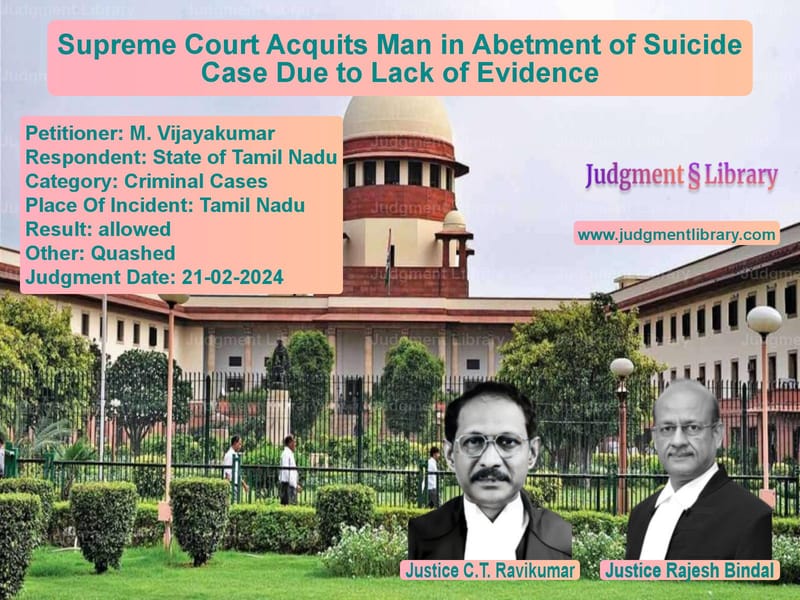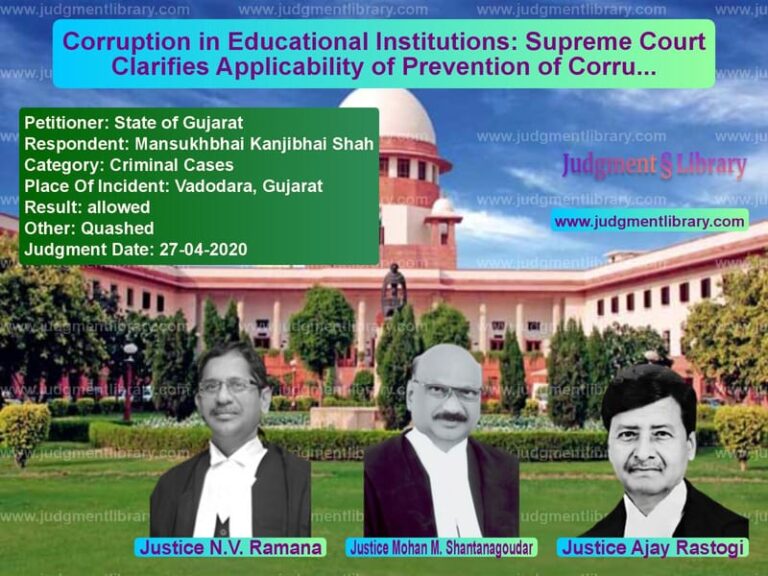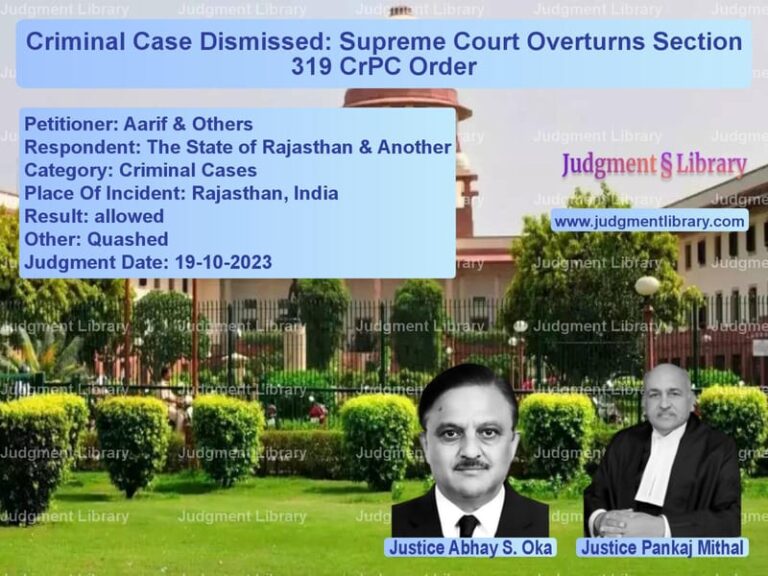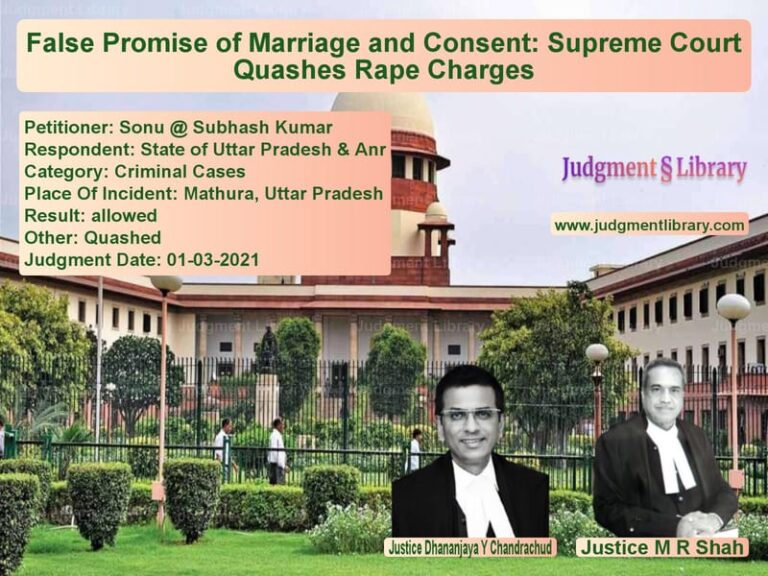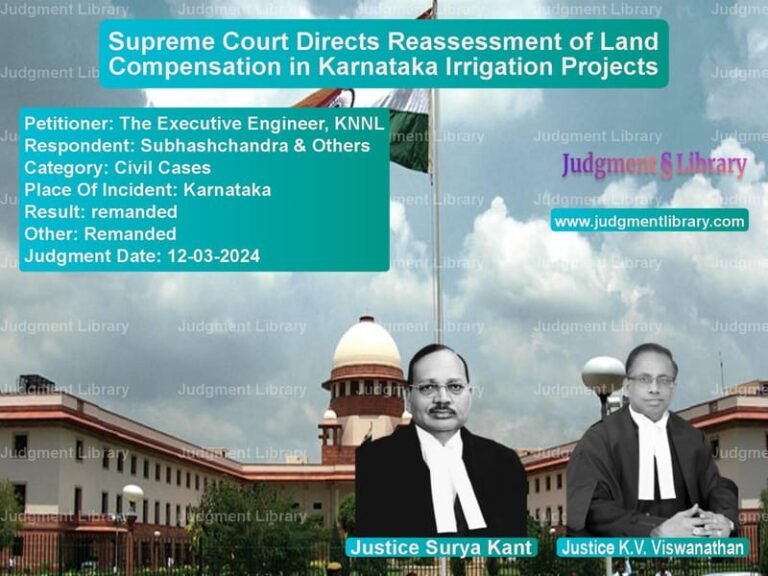Supreme Court Acquits Man in Abetment of Suicide Case Due to Lack of Evidence
The Supreme Court of India has acquitted M. Vijayakumar, who was convicted under Section 306 of the Indian Penal Code (IPC) for abetting the suicide of Senthil Kumar. The Court found that the prosecution failed to prove the essential elements of abetment under Section 107 IPC and that the conviction was based on weak circumstantial evidence. This ruling highlights the importance of proving direct instigation in abetment cases and ensures that wrongful convictions do not occur based on mere suspicion.
Background of the Case
M. Vijayakumar was accused of abetting the suicide of Senthil Kumar, who had allegedly taken his own life on December 6, 2002. The prosecution claimed that the appellant and another accused, Ravichandran (A-2), had kidnapped and wrongfully confined the deceased in a tailoring shop due to an unpaid loan of Rs. 2,000. The prosecution argued that the victim was unable to bear the torment and committed suicide as a result.
Initially, Vijayakumar was convicted under Sections 342, 365, and 306 IPC and sentenced to seven years of rigorous imprisonment. The Madras High Court later acquitted him of the kidnapping and wrongful confinement charges but upheld his conviction under Section 306 IPC, reducing his sentence to three years. Dissatisfied with the verdict, he appealed to the Supreme Court.
Arguments by the Appellant (M. Vijayakumar)
- The prosecution failed to establish a clear mens rea (guilty intent) required for abetment under Section 107 IPC.
- He had no intention to instigate or provoke the deceased to commit suicide.
- There was no direct act of instigation or aiding that led to the suicide.
- The High Court’s finding was contradictory—it acquitted him of wrongful confinement but still convicted him of abetment.
- Several key witnesses, including one Kishore and an alleged eyewitness Alexander, were not examined in the trial.
Arguments by the Respondent (State of Tamil Nadu)
- The deceased was under extreme pressure due to the appellant’s actions and saw no other option but to commit suicide.
- The prosecution’s case was based on witness statements that indicated Vijayakumar’s involvement.
- The trial court’s judgment should be upheld, as the accused’s actions directly led to the suicide.
Supreme Court’s Observations
1. Legal Requirements for Abetment of Suicide
The Court reiterated that to convict a person under Section 306 IPC, the following elements must be proven:
- The deceased committed suicide.
- The accused abetted the suicide.
- The abetment falls under Section 107 IPC, which includes instigation, conspiracy, or intentional aiding.
The Court referred to past rulings in M. Mohan v. State and Madan Mohan Singh v. State of Gujarat, emphasizing that the prosecution must establish direct instigation for a conviction under Section 306 IPC.
2. Lack of Direct Instigation or Mens Rea
The Court found that the prosecution had failed to prove the appellant’s intent to instigate the suicide. It stated:
“In order to convict a person under Section 306 IPC, there has to be a clear mens rea to commit the offense. It also requires an active act or direct act which led the deceased to commit suicide, seeing no option.”
Since the appellant’s alleged role in wrongful confinement was not proven, there was no basis for holding him guilty of abetment.
3. Weaknesses in the Prosecution’s Case
The Supreme Court noted several critical gaps in the prosecution’s case:
- The alleged eyewitnesses did not testify.
- There was no forensic evidence linking the accused to the act of instigation.
- The High Court’s decision to acquit him of wrongful confinement contradicted the charge of abetment.
4. Misapplication of Section 106 of the Evidence Act
The High Court had placed the burden of proof on the accused under Section 106 of the Evidence Act, requiring him to explain how the deceased entered the tailoring shop. The Supreme Court found this erroneous, stating:
“Section 106 cannot be used to shift the burden of proving the offense from the prosecution to the accused. It is only when the prosecution has led evidence that sustains a conviction that the question of shifting the onus arises.”
Final Judgment
- The Supreme Court set aside the High Court’s judgment.
- The conviction of Vijayakumar under Section 306 IPC was quashed.
- He was acquitted of all charges and ordered to be released.
Legal and Social Implications
1. Strengthening the Standard of Proof
This ruling reinforces that courts must require strong evidence before convicting a person under Section 306 IPC.
2. Protection Against Wrongful Convictions
The judgment ensures that individuals are not convicted based on circumstantial evidence or weak inferences.
3. Misuse of Abetment Laws
The case serves as a reminder that laws meant to punish abetment must not be misused to target individuals without clear evidence.
4. Fair Application of Section 106 of the Evidence Act
The ruling clarifies that the burden of proof in criminal cases remains with the prosecution.
Conclusion
The Supreme Court’s decision in this case upholds the fundamental principle that criminal convictions must be based on conclusive evidence. By acquitting M. Vijayakumar, the Court reinforced that wrongful convictions should not occur due to weak prosecution cases or misplaced legal interpretations. This judgment will serve as a key precedent in future abetment of suicide cases, ensuring fairness and justice.
Petitioner Name: M. Vijayakumar.Respondent Name: State of Tamil Nadu.Judgment By: Justice C.T. Ravikumar, Justice Rajesh Bindal.Place Of Incident: Tamil Nadu.Judgment Date: 21-02-2024.
Don’t miss out on the full details! Download the complete judgment in PDF format below and gain valuable insights instantly!
Download Judgment: m.-vijayakumar-vs-state-of-tamil-nadu-supreme-court-of-india-judgment-dated-21-02-2024.pdf
Directly Download Judgment: Directly download this Judgment
See all petitions in Suicide Cases
See all petitions in Bail and Anticipatory Bail
See all petitions in Judgment by C.T. Ravikumar
See all petitions in Judgment by Rajesh Bindal
See all petitions in allowed
See all petitions in Quashed
See all petitions in supreme court of India judgments February 2024
See all petitions in 2024 judgments
See all posts in Criminal Cases Category
See all allowed petitions in Criminal Cases Category
See all Dismissed petitions in Criminal Cases Category
See all partially allowed petitions in Criminal Cases Category

